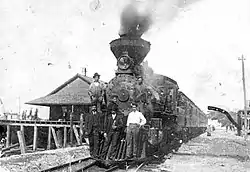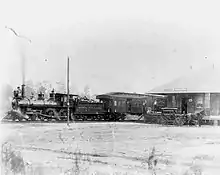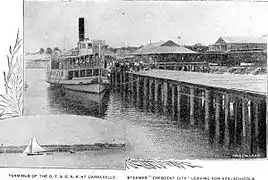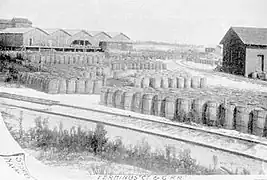Georgia Florida and Alabama Railroad
The Georgia, Florida and Alabama Railroad[1][note 1] (the GF&A), known as the Sumatra Leaf Route, and colloquially as the Gopher, Frog & Alligator[2][3] was a 180 miles (290 km)-long railroad from Richland, Georgia to Carrabelle, Florida.[4] It was founded in 1895 as a logging railroad, the Georgia Pine Railway.
 A Georgia, Florida and Alabama Railroad train at Carrabelle, 1906 | |
| Overview | |
|---|---|
| Headquarters | Arlington, Georgia |
| Reporting mark | GF&A |
| Locale | Southwest Georgia, Northwest Florida |
| Dates of operation | 1895–1944 |
| Technical | |
| Track gauge | 1,435 mm (4 ft 8+1⁄2 in) (standard gauge) |
| Length | 180 miles (290 km) |
The northern and southern ends of the railroad have been abandoned, but the section from Cuthbert, Georgia, to Tallahassee, Florida, remains in use by various railroads.
Route description
The northern terminus of the line was at Richland, where it met the Savannah, Americus and Montgomery Railway and the Columbus Southern Railway. It ran almost due south through Cuthbert and Edison to reach Arlington, where it crossed the Central of Georgia Railway. It continued through Colquitt and Bainbridge before crossing the Flint river and entering Florida. It continued through Sopchoppy and Tallahassee and on to its southern terminus in Carrabelle on the Florida Gulf Coast.[5]
History
Construction and early years

Hannibal Kimball promoted the Bainbridge, Cuthbert and Columbus Railroad to run north-to-south through southwest Georgia in 1869. Although work began on construction in 1870, it was never completed, and in 1872 the project was abandoned amidst financial problems and bond endorsement issues that stirred allegations of impropriety against Kimball. During the 1880s, attempts were made to revive the railroad, with some activity taking place in the middle of that decade, but this too came to nothing.[6]
Finally, in 1895 local entrepreneur J. D. Williams laid rails on part of the route creating the Georgia Pine Railroad connecting Bainbridge to Arlington. The railroad had only been intended for logging, but since it provided an additional rail route from Georgia into Florida and connected with other railroads, traffic increased.[7] By 1898, the railroad was renamed the Georgia Florida and Alabama Railroad[6] and by 1901, it had been extended north to Richland.[5] In 1902, the GF&A completed the section from Tallahassee to Bainbridge.[8]
Tallahassee to Carrabelle

In 1906, the Georgia Florida and Alabama Railway purchased the Carrabelle, Tallahassee & Georgia Railroad (CT&G), which ran from Tallahassee south to Carrabelle on the Gulf of Mexico. The CT&G from Carrabelle north was first chartered as the Thomasville, Tallahassee and Gulf Railroad in 1883. Construction began from Carrabelle to the Sopchoppy River, but it stopped there since the company could not obtain funding to build a bridge over the river.[7]
The line was reorganized as the Augusta, Tallahassee and Gulf Railroad in 1889. It was then purchased by William Clark who owned 175,000 acres of pine lands near the railroad. Clark reincorporated the line as the Carrabelle, Tallahassee & Georgia Railroad on January 5, 1891. Construction was complete to Tallahassee by October 1893.[7]
CT&G also had stops at Hilliardville, Crawfordville, MacIntyre, and Lanark (site of an elegant casino/hotel). From Carrabelle, the paddle steamer Crescent City, owned by the CT&G, made daily round trips to Apalachicola, to which there was no road or rail access at the time.[7]
Once the Georgia Florida and Alabama Railroad acquired the CT&G, the GF&A reached its greatest extent from Richland, Georgia to Carrabelle, Florida, a distance of 180 miles.
 CT&G train approaching Tallahassee in 1895
CT&G train approaching Tallahassee in 1895 Steamer Crescent City at terminus in Carrabelle in 1895
Steamer Crescent City at terminus in Carrabelle in 1895 Terminus at Carrabelle in 1898
Terminus at Carrabelle in 1898
Later Years
The GF&A was leased to the Seaboard Air Line Railway in 1927. The Seaboard went into receivership at the end of 1930,[9] and the lease was revoked in 1931. The Seaboard was reformed after receiving government loans, and it agreed to operate, but not lease the GF&A. In 1944, the court that was overseeing the Seaboard's receivership authorized the company to purchase 90% of the GF&A's bonds.[10] Once under Seaboard ownership, they designated the line north of Bainbridge as their Richland Subdivision and south of there as the Bainbridge Subdivision.[11][12]
In 1948, the line was abandoned from Carrabelle to Tallahassee.[7]
The Seaboard Air Line became part of CSX Transportation by 1980. In 1983, the former GF&A line north of Bainbridge was sold off to the South Carolina Central Railroad, and in 1989 it became part of the Georgia Southwestern Railroad.[13] In 1997, the portion of the GF&A route from Richland south to Cuthbert was abandoned,[14] and in 2002 the Georgia Department of Transportation acquired the remaining Cuthbert to Bainbridge section. The Georgia Southwestern remains the operator of the line.[15][16]
Current conditions
North of Bainbridge
The segment from Cuthbert to Bainbridge segment is now owned by the Georgia Department of Transportation and operated by the Georgia Southwestern Railroad.
Bainbridge Subdivision
Bainbridge Subdivision (CSX) | |||||||||||||||||||||||||||||||||||||||||||||||||||||||||||||||
|---|---|---|---|---|---|---|---|---|---|---|---|---|---|---|---|---|---|---|---|---|---|---|---|---|---|---|---|---|---|---|---|---|---|---|---|---|---|---|---|---|---|---|---|---|---|---|---|---|---|---|---|---|---|---|---|---|---|---|---|---|---|---|---|
| |||||||||||||||||||||||||||||||||||||||||||||||||||||||||||||||
The segment from Bainbridge to Tallahassee is still in service. This segment is still known as the Bainbridge Subdivision and it is operated by CSX from Bainbridge to Attapulgus.[17] CSX sold the remaining segment from Attapulgus to Tallahassee to the Florida Gulf & Atlantic Railroad in 2019.[18]
Currently, the line's milepost numbers begin in Tallahassee at 52 and increase from there. This is due to the fact that the numbering still reflects the line's full length to Carrabelle, which was mile 0 before the track between there and Tallahassee was abandoned.[19]
South of Tallahassee
A 2.4-mile part of the abandoned Tallahassee-Carrabelle segment of the GF&A is now the Tallahassee-Georgia Florida and Alabama (GF&A) Trail in the Apalachicola National Forest.[20][21][22] Research work on the rail-to-trail project was done by Genesis Group.[23]
Historic stations

| State | Milepost | City/Location | Station[12][11] | Connections and notes |
|---|---|---|---|---|
| FL | SLC 0.0 | Carrabelle | Carrabelle | |
| SLC 5.0 | Lanark | |||
| SLC 13.5 | McIntyre | |||
| SLC 15.0 | Curtis Mill | |||
| SLC 19.2 | Sopchoppy | Sopchoppy | ||
| SLC 21.4 | Ashmore | |||
| SLC 29.5 | Crawfordville | |||
| SLC 30.9 | Raker's Mill | |||
| SLC 37.0 | Hilliardville | |||
| SLC 40.1 | Spring Hall | |||
| SLC 41.9 | Turner | |||
| SLC 50.0 | Tallahassee | Tallahassee | junction with Florida Central and Western Railroad (FC&P/SAL) | |
| SLC 58.5 | Lake Jackson | |||
| SLC 66.6 | Havana | Havana | ||
| SLC 68.3 | Hinson | |||
| SLC 70.9 | Jamieson | |||
| GA | SLC 77.8 | Attapulgus | Attapulgus | |
| SLC 82.3 | Jamieson | |||
| SLC 90.3 | Bainbridge | Bainbridge | junction with Savannah, Florida and Western Railway (ACL) | |
| SLC 96.2 | Lynn | |||
| SLC 101.0 | Eldorendo | |||
| SLC 105.7 | Babcock | |||
| SLC 110.9 | Colquitt | Colquitt | ||
| SLC 114.9 | Corea | |||
| SLC 119.7 | Damascus | Damascus | ||
| SLC 125.4 | Rowena | |||
| SLC 129.5 | Arlington | Arlington | junction with Central of Georgia Railway | |
| SLC 139.2 | Edison | Edison | ||
| SLC 145.4 | Carnegie | |||
| SLC 154.7 | Cuthbert | Cuthbert | ||
| SLC 163.7 | Benevolence | |||
| SLC 168.5 | Troutman | |||
| SLC 174.6 | Kimbrough | junction with Columbus Southern Railway (SAL) | ||
| SLC 181.0 | Richland | Richland | junction with: | |
Notes
- Sources differ on the use of Railroad vs Railway in the official name of the company.
References
- "An Act To authorize the Georgia, Florida and Alabama Railway" (PDF). Library of Congress. 20 June 1906.
- "Historical & Educational".
- Hallberg, M.C. (21 December 2009). RAILROADS IN NORTH AMERICA Some Historical Facts and An Introduction to an Electronic Database of North American Railroads and Their Evolution.
- Prince, Richard E. (2000). Seaboard Air Line Railway: Steam Boats, Locomotives, and History. Indiana University Press. p. 97. ISBN 0-253-33695-3.
- Caldwell, Wilber W. (2001). The Courthouse and the Depot: The Architecture of Hope in an Age of Despair : a Narrative Guide to Railroad Expansion and Its Impact on Public Architecture in Georgia, 1833-1910. Mercer University Press. pp. 298, 507–513. ISBN 978-0-86554-748-3.
- Florida Public Service Commission (1898). Report. p. 10.
- Hensley, Donald R. "The story of the Georgia Florida & Alabama RR". Taplines. Retrieved 18 November 2022.
- Florida Railroad and Public Utilities Commission (1902). Report. pp. 6, 36.
- Prince, Richard E. (2000) [1966]. Seaboard Air Line Railway: Steam Boats, Locomotives, and History. Indiana University Press. ISBN 978-0-253-33695-8.
- United States. Congress. House. Committee on the Judiciary. Special Subcommittee on Bankruptcy and Reorganization (1947). Railroad Reorganization: Hearings Before Special Committee on Bankruptcy and Reorganization, Eightieth Congress, First Session, on H.R. 3237. U.S. Government Printing Office. pp. 242–.
- Seaboard Air Line Railroad South Carolina Division Timetable (1944)
- Seaboard Air Line Railroad North Florida Division Timetable (1949)
- Lewis, Edward A. (1996). American Shortline Railway Guide. Kalmbach Publishing, Co. p. 183. ISBN 978-0-89024-290-2.
- Thornhill, Tommy (2002). "Pig Trails of Southwest Georgia: Part 2". Lines South. White River Productions. 19 (1): 22–29.
- "STB Finance Docket No. 34057". 18 January 2002. Retrieved 13 September 2010.
- "STB Finance Docket No. 34057". 30 April 2002. Retrieved 13 September 2010.
- CSX Jacksonville Division Timetable
- "Florida Gulf & Atlantic Railroad". RailUSA. Retrieved 19 August 2021.
- Harmon, Danny. "How To Read Trackside Signs & Markers". YouTube. Retrieved 12 December 2018.
- "GF&A Trail". USDA Forest Service. Retrieved 19 October 2019.
- "Apalachicola National Forest - History & Culture".
- "Georgia Florida & Alabama Trail (GF&A Trail) | Florida Trails | TrailLink". www.traillink.com.
- "Genesis". Genesis - Engineering, Planning, Landscape Architecture, Survey, and GIS.
External links
- "Georgia, Florida and Alabama Railway in Seaboard Air Line Railway: Steam Boats, Locomotives, and History by Richard E. Prince, 1966; reprinted 2000.
- "The Story of the Georgia Florida and Alabama RR" by Donald R. Hensley, Jr., at Taplines.net - includes a good map of the GF&A prior to its acquisition by the Seaboard in 1927.